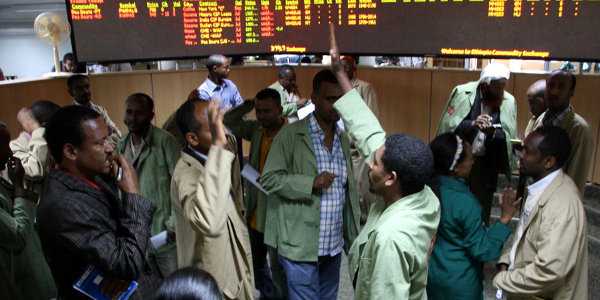ADDIS ABABA – The Ethiopian Commodity Exchange (ECX) has been building regional trading centers to improving its accessibility across the country, particularly around major regional agricultural hubs.
The exchange has been building regional trading centers in Hawassa, Nekemete, and Humera whose constructions are fully completed.
“We are also building in Jimma, Adama and Gonder,” ECX CEO, Ermias Eshetu told The Ethiopian Herald that. “And we are going to reach out to be closer to the agro hubs across the country.”
“We are going to allow potentially more trading to happen across the country. So step by step, there are a lot of things in action,” he added.
ECX transacts over 27 billion Ethiopian birr (US$1.16 billion) per year. “We trade up to 300 million birr a day on peak seasons, while this goes down to a 100 million on low seasons,” he said. “This is not profit or income. It is the transaction value of what the exchange does, which accounts for eight percent of the national GDP,” Ermias noted.
Up on its establishment, the value of one trading seat at the exchange was 50,000 birr. At the moment, the value has gone up to 3 million.
The exchange is also planning to introduce the identity preserve trade that is particular to coffee, a major export commodity of Ethiopia. As a system, identity preservation preserves the identity of the source or nature of the crop or materials.
“We have ambitions to modernize all the trading mechanisms, bring about more efficiency and make our country more competitive in the international market,” the CEO said. “So we are looking at how more farmers can come and sale on the exchange directly.”
The exchange is also thinking about risk mitigation strategies. It is also planning to introduce complex risk instruments that have taken the world into a modern and more sophisticated market level, according to him.
“We are also trying to introduce future contracts and other products. We are trying to persuade banks and insurance companies to come up with innovative insurance products so that they can insure the farmers,” he said.
“Exchanges like the Chicago Mercantile, have been there since 1820s and 30s. It has taken them some nearly two centuries to get to where they are right now,” he said. We are just starting the concept of a modern market place and it has to be filtered down to the buyers, sellers, farmers and policy makers, as well as to all those who are affected in the value chain. Their understanding of modern market has to evolve with exchange in order to make it successful.”
When it starts, the exchanges traders’ educational level was as little as fourth grade or below. Currently, ECX’s traders’ educational background is 12th grade or above and they are certified electronic traders. “We have over 1000 electronic traders,” he added.
As to him, it is physically impossible for the exchange to directly reach out the millions of farmers across the country. Hence farmers are represented through cooperatives and unions. “Some farmers are also represented directly in the exchange as long as they fulfill the criteria to have sufficient liquidity and the skills needed for modern market,” Erimias noted.
“Those who are not members of cooperatives or unions or cannot make direct trade can trade through intermediaries or clients.”
ECX has approximately 348 members, about 30 of them are cooperatives, and the rest are intermediary members or direct buyers. Its major commodities include coffee, sesame, haricot, maize and wheat.
Abiy Hailu









 CAPS: the new proprietary system using capsules made of 85% recycled aluminium
CAPS: the new proprietary system using capsules made of 85% recycled aluminium







